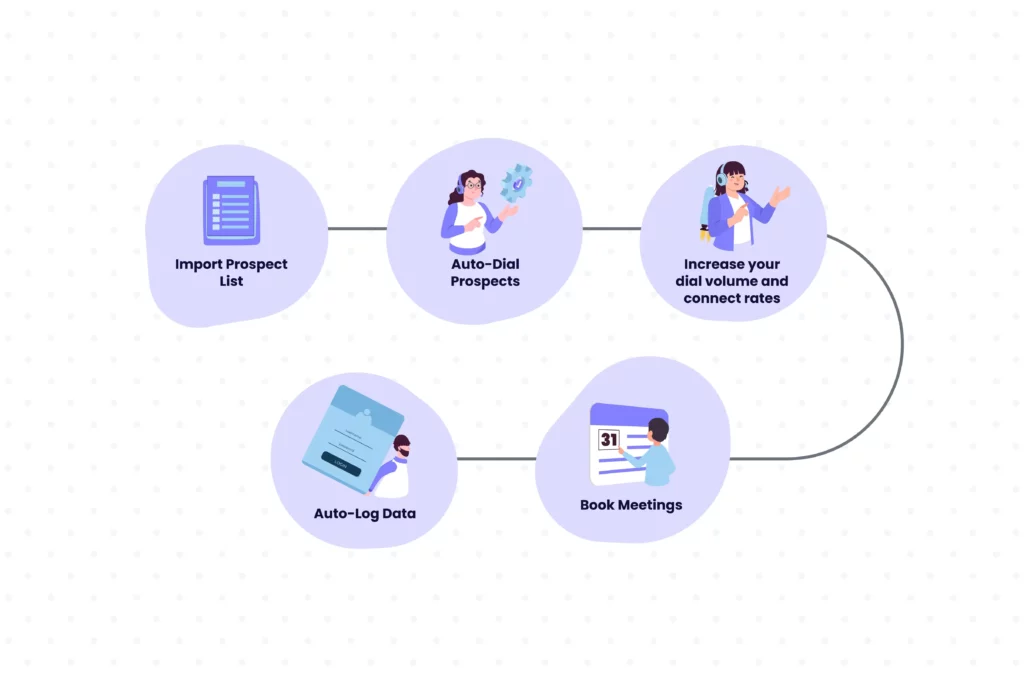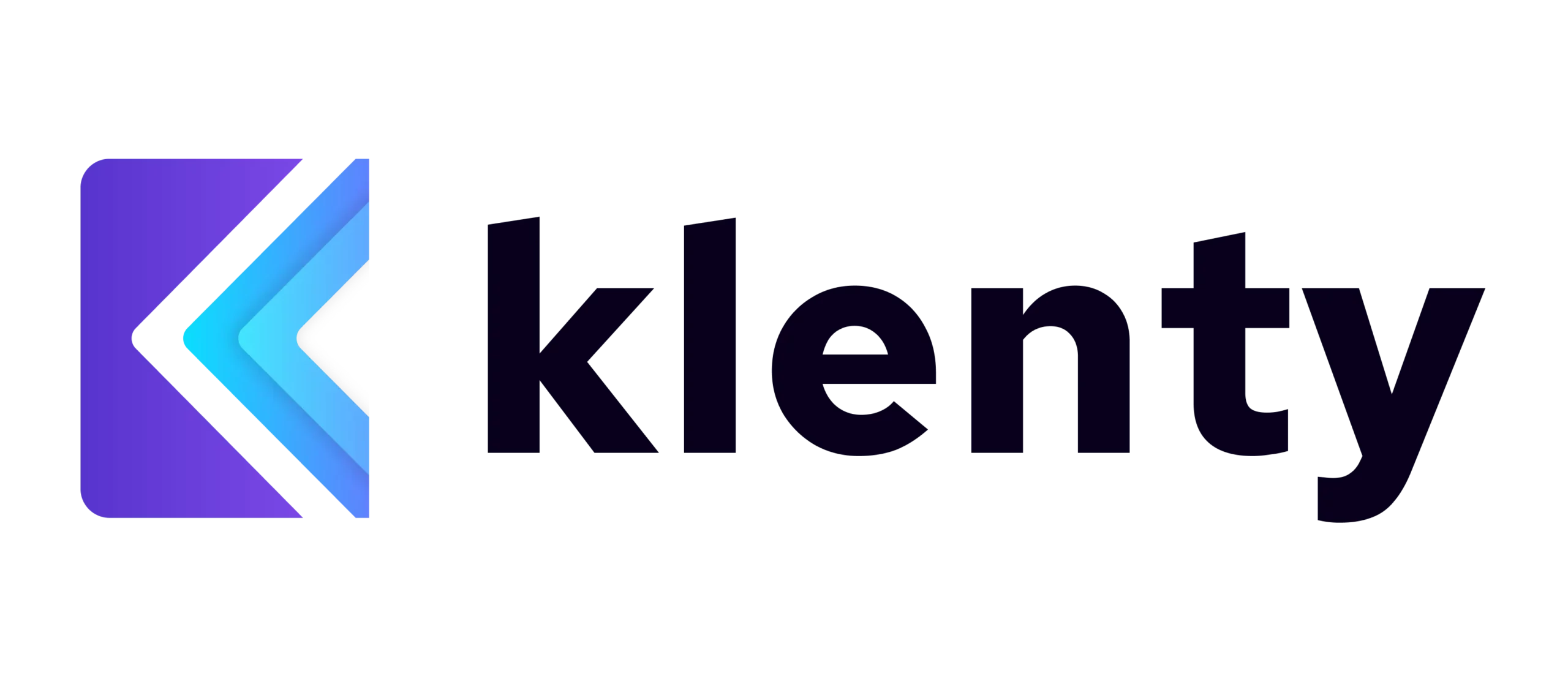Cold calling has always been a key part of sales, but it’s not what it used to be.
Reaching decision-makers, getting prospects' attention, dealing with unanswered calls, and managing repetitive tasks have made traditional methods less effective today.
Cold calling software automates tasks like dialing, tracking, and follow-ups, allowing sales teams to focus more on conversations than on busywork.
With so many dialers on the market, choosing the right one for your sales team can be a challenge.
So, how do you pick the best dialer?
The key is understanding what a good dialer should do and how it fits with your team’s needs.
In this blog, we’ll guide you through what to look for when selecting a dialer, helping you build a more effective cold-calling strategy.
How to Choose the Right Dialer for Your Team
1. Evaluate Your Business Objectives
Begin by identifying the core goals of your cold-calling strategy. Are you aiming to scale your call volume quickly or do you need a more personalized approach for handling complex leads? Your answer will shape the type of dialer that best supports your needs.
- Scaling call volume: If your goal is to reach a large number of prospects in a short time, you’ll need a dialer that can automate the dialing process and support multi-line dialing. This helps increase outreach and efficiency without overwhelming your reps.
- Personalized outreach: If you're focusing on building relationships or working with more complex leads, a dialer that allows single-line dialing may be more suitable. This type of dialer gives reps the ability to personalize each call and engage in meaningful conversations.
2. Prioritize Low Latency for Faster Connection
No one likes waiting. A dialer with low latency ensures smooth transitions between calls. This means your SDRs spend less time waiting for connections and more time speaking with prospects. Choose a dialer that minimizes the latency and ensures that calls are connected quickly and efficiently.
3. Eliminate Repetitive Tasks with Automation
Reps spend a lot of time on repetitive tasks like dialing numbers, logging call details, and taking notes after every call. It’s time-consuming and slows them down.
A good dialer should take care of these monotonous tasks for you:
- Automated Dialing: Automatically dialing the next number on the list and reducing the downtime between calls.
- Auto-Logging of Call Details: Logging call outcomes and updating your CRM in real-time without manual effort.
With your dialer capable of such automation, your team can completely focus on prospect conversations instead of getting stuck in admin work.
4. Ensure Seamless Integration with Your Tech Stack
Each time an SDR completes a call, they need to update the call outcome, schedule follow-ups, and log important details in the CRM. These tasks are not only time-consuming but also prone to errors, especially when managed manually.
But a dialer with a CRM integration can make it easier because:
- Call outcomes are automatically updated
- Real-time data sync keeps everyone aligned
- Reps focus on conversations, not data management
So, choosing a dialer with strong CRM integration helps reduce errors, saves time, and keeps your team’s workflows consistent.
5. Track and Analyze Call Performance
Tracking activity metrics helps both SDRs and managers monitor progress and find areas to improve. A good dialer should include:
- Dashboards for Quick Overviews: Show daily call activity, like calls made, connection rates, and call durations, all in one place.
- Customizable Reports: Let managers filter call data by rep, date, or outcome to track individual and team performance easily.
- Detailed Call Logs: Help SDRs review their activity, spot patterns, and adjust their approach when needed.
- Call Recordings: Allow to revisit past calls, analyze interactions, and learn what works or what doesn’t.
Pick a dialer with these features to help SDRs review their work and give managers the tools they need to identify issues and take action quickly, without manual tracking.
6. Simplify Coaching with Actionable Feedback
To effectively coach your team, feedback needs to be clear and actionable. Every call presents an opportunity to improve, and feedback can be broken down into two key types:
- Process Feedback: Focuses on the operational flow—are calls being logged accurately? Are follow-ups scheduled promptly? Are the transitions between call stages smooth?
- Talk Track Feedback: Focuses on the content and delivery—did the rep handle objections well? Was the messaging aligned with the prospect’s needs? How effectively did they steer the conversation?
Providing both types of feedback can help your team improve the quality of each call, not just hit call volume targets.
To make your coaching effortless and actionable, choose a dialer that supports managers in delivering these insights without manual effort—through call recordings, clear activity insights, and detailed call breakdowns.
Choosing the right dialer for your team comes down to finding a solution that aligns with your goals, simplifies workflows, and makes cold outreach easy for both SDRs and managers.
How Dial IQ Meets Your Cold Calling Needs

When choosing the right dialer for your sales team, Dial IQ serves as a complete solution to meet all your cold calling needs. Let’s explore how it can check all the boxes of a compatible dialing solution.
Dialing Solutions For Every Outreach Strategy
Dial IQ offers a range of dialers designed to fit various cold-calling strategies, whether you’re focused on scaling your call volume or prioritizing personalized outreach. With multiple dialing options, you can tailor your approach to meet the specific needs of your team and goals.
- High-volume outreach:
If your goal is to reach a large number of prospects quickly, Dial IQ has two dialer options:
Parallel Dialer: Allows you to dial up to 5 numbers simultaneously, helping your team increase outreach by up to 5X compared to traditional methods.
Power Dialer: Sequentially dials prospects on your list one after the other. This ensures minimal downtime between calls, so your can team to maintain a high call volume.
- Personalized outreach or follow-ups:
If your focus is on personalized engagement or follow-up calls, the Power Dialer is a better fit. It helps you stay on track with high-connect lists, so no prospect is missed.
- CRM integration:
For teams that rely heavily on a CRM, Dial IQ’s CRM Dialer enables reps to make calls directly from the CRM interface without the need to switch tabs. This streamlines the workflow and keeps all call logs and updates in one place.
- Improving Connect Rates and Engagement
Maximizing connect rates is a top priority for any sales team, and Dial IQ enhances this with several key features:
- Local Presence Dialing: Displays the local area code of the prospect’s region on the caller ID, making them more likely to answer the call.
- Time Zone Detection: Automatically adjusts calling times to ensure calls are placed at optimal hours for each prospect, increasing the likelihood of connecting.
- ‘From’ Number Rotation: Regularly rotating the dialing numbers prevents calls from being flagged as spam.
- Voicemail Drop: Reps can leave pre-recorded voicemails automatically when a call goes unanswered, increasing the chances of getting a callback.
These features ensure that calls are made at the right time, and in the right way, boosting the chances of engagement.
- Reducing Manual Work for Your Team
Time-saving is essential in any sales operation, and Dial IQ helps automate tedious tasks, allowing your team to focus on high-priority calls.
- CRM Integration:
The prospect and account data can be easily imported from your CRMs and the call details will be automatically logged into the CRM eliminating manual data entry.
Auto-detects when a call reaches voicemail and moves to the next call, saving time and preventing reps from waiting through the voicemail message.
Dial IQ transcribes calls as they happen, allowing reps to focus fully on the conversation without worrying about taking notes. This ensures that no important details are missed.
- AI Call Summaries and Insights:
Following each call, AI generates a summary with key points, next steps, and actionable insights automatically. This saves your rep from taking notes during the call and focus on the conversation instead.
- Automated Outcome Detection:
Dial IQ automatically detects and logs call outcomes, such as successful connections or voicemails, directly into the CRM. This eliminates manual updates, allowing reps to move on to the next call quickly.
These features ensure reps spend more time engaging with prospects and less on administrative tasks.
Comprehensive Call Analytics and Coaching for Continuous Improvement
Dial IQ’s analytics features provide detailed insights into call outcomes and areas for improvement.
1. Customisable Graphical and List Reports:
Dial IQ allows managers to view call performance through graphical or list formats, making it easy to analyze data. Reports can be filtered in two key ways:
By Call Status: See the total number of calls made, how many went unanswered, were sent to voicemail, not logged, or invalid.
By Call Outcome: Track total talk time, successful connects, and specific call outcomes—all of which are automatically detected and logged.
2. Customizable Dashboards:
Dial IQ offers easy-to-view dashboards that can be tailored to specific call activities
- AI Talk Track Tables:
The AI Talk Track Table breaks down calls into actionable sections (e.g., introductions, objections, closing) and provides AI-powered recommendations, helping sales managers coach reps effectively and improve call quality.
With such actionable analytics and coaching capabilities, teams can refine their approach to cold calling and achieve better results.
3. Seamless Integration with Your Sales Stack
Dial IQ syncs effortlessly with CRMs like Salesforce, HubSpot, Pipedrive, and Zoho, ensuring a smooth workflow between dialing, prospect management, and performance tracking.
- Allows reps to make calls directly from within the CRM.
- Automatically detects and logs call outcomes, call status, and call recordings along with the notes into the CRM in real-time, eliminating the need for double data entry.
This integration simplifies your sales process and ensures that your team has the right data at their fingertips without switching between platforms.
Conclusion
The best dialer doesn’t just help you make more calls. It simplifies your cold calling workflows, automates repetitive tasks, and gives managers the insights they need to coach teams effectively. It turns cold calling into a scalable process while helping your SDRs improve the quality of every conversation and consistently hit their goals.

